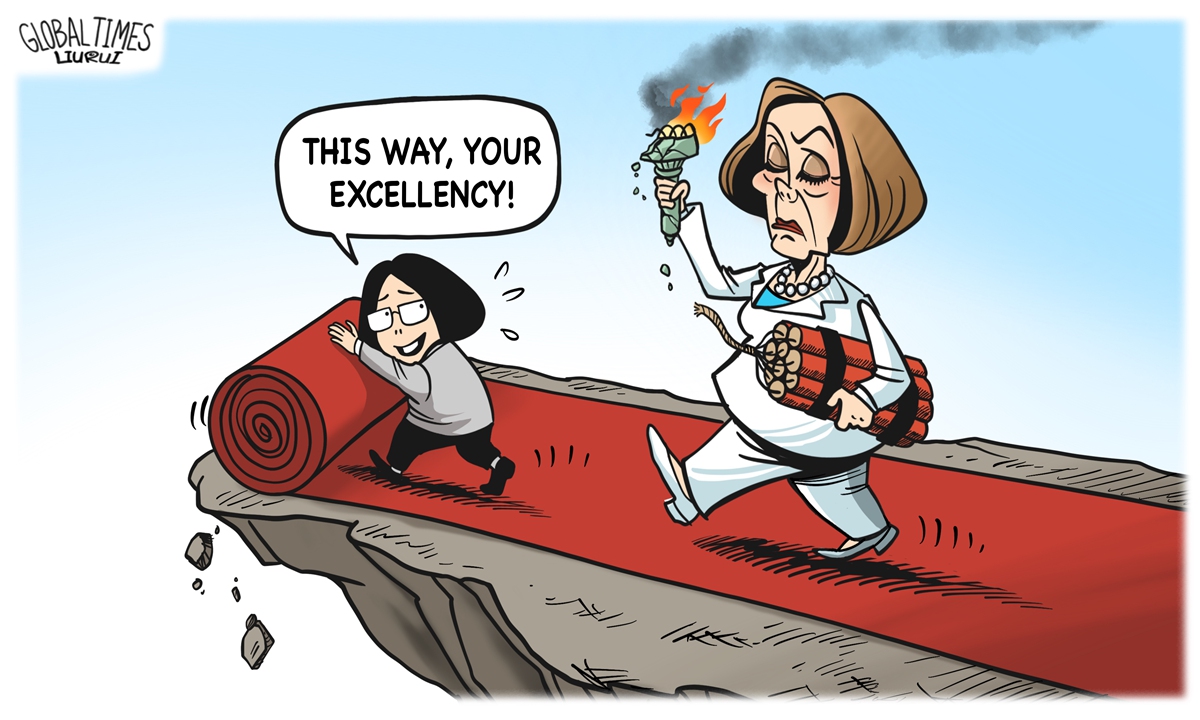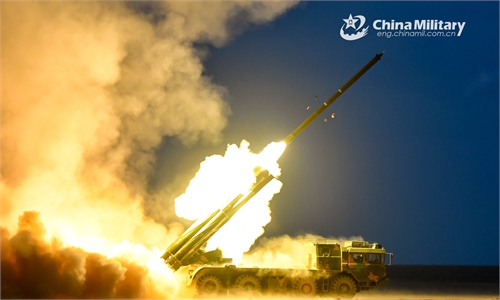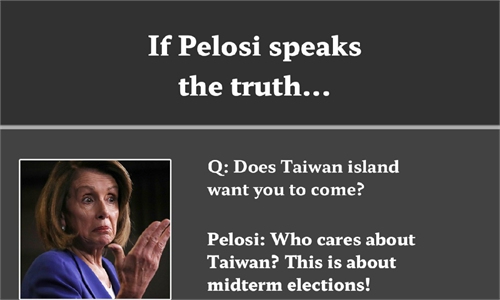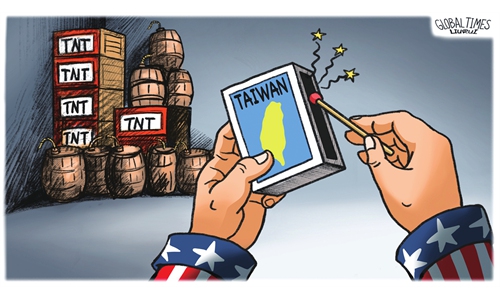Pelosi’s visit has been a big loss for Taiwan: former US Marine Corps intelligence officer

Suicidal mission. Illustration: Liu Rui/GT
Editor's Note:US Speaker of the House of Representatives Nancy Pelosi's visit to Taiwan island, despite strong opposition from China, has escalated regional tension, plunged China-US relations to new lows and damaged US' own interests. How has this visit influenced the island of Taiwan and the cross-Straits situation? Will the possibility of a war between China and the US in the Taiwan Straits increase in the next few years? Global Times (GT) reporter Yu Jincui talked with Scott Ritter (Ritter), a former US Marine Corps intelligence officer, over these issues.
GT: After Nancy Pelosi's Taiwan visit, there is a view that the provocative trip is a "win" for her but there are no benefits to US interests. What's your take on her trip?
Ritter: US interests, in terms of foreign and national security policy, are not the prerogative of the Speaker of the House of Representatives. Pelosi, like other senior members of Congress from both chambers, are consulted on critical issues, and of course Congress is empowered to hold hearings during which it can ask questions of administration officials. Congress also has the power of the purse — control of the budget — which can be used to influence policy. But in the end, it is the President who is the ultimate decision-maker regarding policy formulation and implementation and, as such, the ultimate arbiter as to what constitutes "the national interest."
Seen in this light, Pelosi's trip did not conform to existing State Department policy positions, was deemed disruptive by the Department of Defense, and was practically disavowed by the White House. Pelosi was very much a rogue agent, and as such her visit was not in line with US interests. Moreover, given the harsh reaction from China, it is difficult to articulate a case where Pelosi's visit could be construed as serving US interests.
GT: What does Pelosi's visit actually mean and bring to Taiwan?
Ritter: Taiwan must certainly recognize the reality that any effort to seek independence from China is fantasy which, if acted on, would trigger forcible reunification through military means. Pelosi's visit was an exercise in moving the US away from its confusing policy of strategic ambiguity when it comes to the defense of Taiwan island, and as such a weakening of the fundamental precepts which sustain the one-China policy, namely that Taiwan will never be independent. By hosting Pelosi, Taiwan sent a clear signal that it supported this revamping of US policy and, by extension, was seeking to move closer to independence.
China's response makes it clear that "Taiwan independence" will never be accepted. Given the military and economic pressure being brought on Taiwan because of Pelosi's visit, it is impossible to conclude anything other than that Pelosi's visit has been a big loss for Taiwan.
GT: Beijing announced six large maritime areas and their air space surrounding the island of Taiwan to facilitate live-fire military drills from Thursday to Sunday. How do you interpret the response? What messages does it send out?
Ritter: Despite its anger at Pelosi's visit to Taiwan, Beijing still places the peaceful reunification policy above any forceful reintegration through military means. However, it is critical that a signal be sent to Taiwan that under no circumstances will any political movement toward independence be tolerated. China must make it clear to Taiwan island what the consequences of any effort to gain independence would be, namely military intervention. If the threat of the use of military force is to have any deterrent value, it must be seen as real. China's live-fire military exercises are meant to demonstrate to Taiwan the seriousness China attaches to the issue of "Taiwan independence."
GT: Only a few months after the Russia-Ukraine conflict broke out, the US escalated its conflict with another great power, China. Has the US taken a path of strategic adventurism?
Ritter: US' reliance on "escalating confrontation" in its policy with China predates the Russian-Ukrainian conflict and is representative of a policy "pivot" undertaken back in 2021 by the Biden administration. The Biden administration has never been able to fully articulate the goals and objectives of this policy pivot. Moreover, given the distractions created by the Afghanistan debacle and domestic policy crises, implementation of what passes for a China policy has been uniformly uneven. China has outmaneuvered the US consistently in terms of military power projection (the South China Sea islands), and economic growth (the success of the Belt and Road Initiative, and the creation of the Regional Comprehensive Economic Partnership in place of the failed Trans-Pacific Partnership).
The US has always relied upon its military strength in the Pacific region as the foundation upon which its geopolitical posture rested. Given the inability of the Biden administration to implement a consistent economic policy posture in the Pacific to counter China, the US has fallen back on its military as a platform to project an image of strength. What is seen as an "escalation" by China reflects policy weakness of the US. Indeed, one of the reasons why Nancy Pelosi could implement her rogue Taiwan mission was because when it comes to China policy, the Biden administration is trapped in a sea of chaos and incompetence. Seen in this light, it is difficult to speak of a "strategy" at all.
GT: You gave a three out of 10 in a previous GT interview regarding the possibility of a China-US war over the Taiwan question. In view of Pelosi's trip, has the possibility of a war between China and the US in the Taiwan Straits increased in the next few years?
Ritter: Pelosi's visit to Taiwan will have a meaningful impact on US-China policy, having set in motion a trajectory which pushes the US away from its "one China" policy toward a position which views 'Taiwan independence' as a viable objective. It is impossible to say precisely when, or under what circumstances the final articulation of this policy change will be formally announced, but there should be no doubt in China that this is the direction the US is headed. The key question is whether China can prevail on Taiwan not to take US' bait, and instead remain focused on achieving a peaceful reunification.
Void of a major shift in internal political opinion in Taiwan, however, the impetus toward independence will gain momentum, making a conflict between the Chinese mainland and Taiwan all but inevitable. The key question is, what will the US do in the case of any large-scale conflict between the mainland and Taiwan? This, in large part, depends on the scope, scale, and pace of any such confrontation. Simply put, the faster the mainland can resolve any conflict with Taiwan, the less likely the US would be able to respond militarily. In any event, the seeming inevitability of a future cross-Straits conflict makes the possibility of a US-China military confrontation a distinct possibility.




